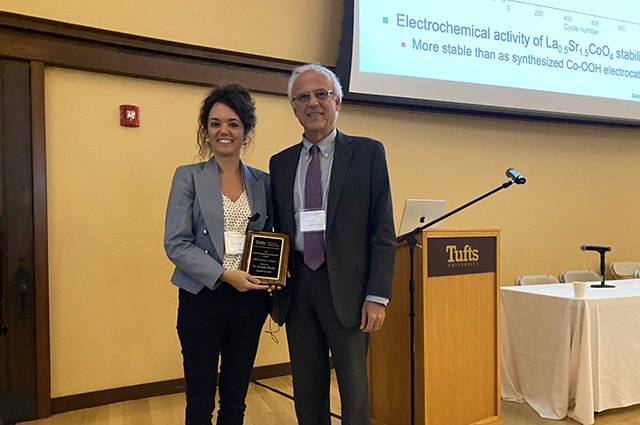Symposium held in honor of Tufts professor

On October 28, 2019, world-renowned chemical engineer and longtime Tufts professor Maria Flytzani-Stephanopoulos passed away. The Tufts Department of Chemical and Biological Engineering recently hosted a symposium in her honor, in conjunction with the New England Catalysis Society. At the event, her husband Gregory Stephanopoulos, MIT’s Willard Henry Dow Professor in Chemical Engineering, presented the inaugural Maria Flytzani-Stephanopoulos Award for Creativity in Catalysis to Professor Eranda Nikolla of the University of Michigan, following a presentation of Nikolla's work on electrocatalysis by nonstoichiometric mixed metal oxides.
During her time at Tufts, Flytzani-Stephanopoulos broke new ground in the field of catalysis. She was a prominent member of the Tufts community and held the titles of Distinguished Professor and the George and Marcy Haber Endowed Professor in Energy Sustainability in the Department of Chemical and Biological Engineering. Lauded throughout her career, she was named a Fellow of the American Association for the Advancement of Science in 2008 and a Fellow of the National Academy of Engineering in 2014.
This fall, the Maria Flytzani-Stephanopoulos Symposium on Single-Site Catalysis opened with remarks from her frequent collaborator Charles Sykes, John Wade Professor in the Department of Chemistry at Tufts. Sykes first met Flytzani-Stephanopoulos in his graduate school years and the two received several awards for their joint research endeavors, including the American Chemical Society Catalysis Leadership award in 2019 and the 2022 Farraday Horizon Prize from the Royal Society of Chemistry, the latter with Associate Professor Prashant Deshlahra of the Department of Chemical and Biological Engineering and graduate students from Sykes’ and Flytzani-Stephanopoulos’ labs.
Symposium attendees gathered in Breed Memorial Hall for a full day of lectures delivered by prominent members of the catalysis community including faculty members from Tufts and universities across the US, a poster session, panel discussions about the future of heterogeneous catalysis, and more. Throughout the symposium, many of the presenters shared work that was built on the foundations of Flytzani-Stephanopoulos’ pioneering research. Susannah Scott of the University of California Santa Barbara delivered the keynote lecture which explored strategies to achieve homogeneity in single site catalysts.
Catalysis is the process during which a catalyst is added to a substance to speed up a chemical reaction. Improving catalysis has implications for making chemical reactions more efficient and sustainable, particularly when it comes to relevant industrial processes. Flytzani-Stephanopoulos contributed significantly to the development of single atom catalysis in her research. Many catalysts are heterogenous, made of some of the right materials and some superfluous materials that may be left over or produce unwanted chemical reactions in addition to the desired reaction. With single atom catalysis, the catalysts are added to the chemical substance one atom at a time, reducing surplus chemical reactions, waste, and cost. Flytzani-Stephanopoulos’ research led the way in this inventive approach which has the potential to make a consequential impact on the sustainability of industrial chemical reactions worldwide.
The event was both a celebration of Flytzani-Stephanopoulos’ groundbreaking work and a continuation of her advancement in the field of catalysis, demonstrating that her innovative spirit lives on in the chemical engineering community.
Department:
Chemical and Biological Engineering